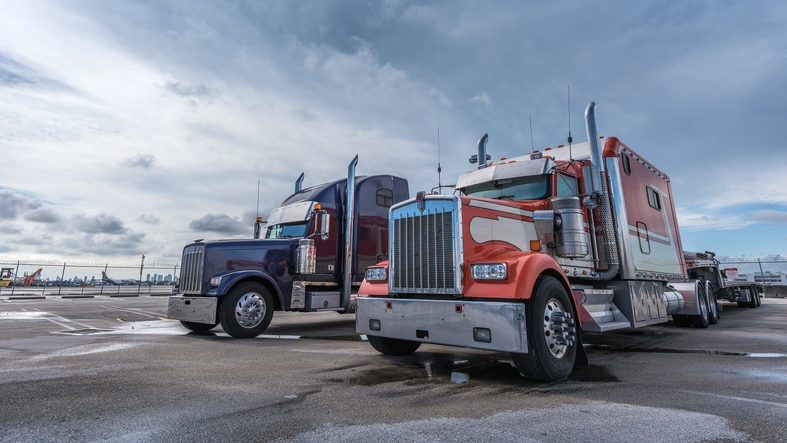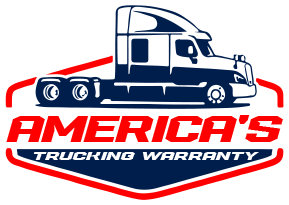Semi Truck Warranty vs. Insurance: Understanding Your Coverage Needs

In the trucking industry, protecting your assets is crucial. A single accident costing $25,000 might seem manageable, but for a carrier with a slim 2% profit margin, that loss translates to $1,250,000 in additional revenue needed to break even.
Beyond the trucks themselves, trucking companies are responsible for the cargo they transport. Damage, theft, or loss of that cargo can be pricey, and just as importantly, it can damage client relationships. That’s why having the right protection is important.
There are two main solutions: semi-truck warranties and insurance policies. A semi truck warranty is a guarantee against specific mechanical failures. Insurance, on the other hand, is a contract that shifts the financial burden of perils like accidents, theft, or damage from the trucker to the insurance company.
In this guide, we’ll help you understand both options.
Semi Truck Warranties
A semi truck warranty is a contractual agreement where the manufacturer or a third-party provider promises to cover the cost of repairs or replacements for certain components of your truck.
These warranties tend to cover defects in materials and workmanship for a predetermined period or mileage. Unexpected engine failures can easily cost tens of thousands of dollars to fix. A warranty can prevent these financial losses and keep your truck on the road.
Unlike commercial truck warranties, semi truck warranties often include specific coverage for after-treatment systems and other heavy-duty components. A big truck warranty sometimes offers the same coverage as semi truck warranties but for class 8 vehicles.
Beyond the immediate cost savings, a good warranty reduces downtime, avoids disruptions to your operations, and can even increase the resale value of your truck.
Types of Warranties
The four main types of semi truck warranties are:
- Factory/manufacturer's warranty: This is the initial semi truck coverage offered by the manufacturer, typically included in the purchase price of a new truck. It's a testament to the manufacturer's confidence in its product. It also often serves as the baseline for future extended coverage.
- Extended warranty: This extends the coverage period beyond the original factory warranty. It's bought separately and offers continued protection against covered repairs, providing peace of mind for owners of older trucks or those with higher mileage.
- Powertrain warranty: This is a popular choice for those primarily concerned with the core mechanics of their truck. This type of warranty focuses on the essential engine, transmission, and drivetrain components.
- Comprehensive/bumper-to-bumper warranty: This option offers the broadest protection. It covers nearly all components of the truck, from bumper to bumper, excluding typical wear-and-tear items like tires and brake pads. Comprehensive warranties tend to be the most expensive.
Coverage
While warranties offer valuable protection, they aren't a blanket solution for every mechanical issue.
Generally, semi truck warranty coverage will include major components like the engine, encompassing internal parts such as pistons, the crankshaft, and cylinder heads. The transmission, whether manual or automatic, is another common area of coverage, protecting against failures in gears, clutches, and casings.
Modern trucks rely heavily on complex after-treatment systems to meet emissions regulations. Warranties often extend to these, covering selective catalytic reduction (SCR) and diesel particulate filter (DPF) systems.
Other parts that might be included, depending on the specific warranty, are the drivetrain, turbochargers, and even certain electronic control units.
Just as important as knowing what's covered is understanding what's not covered:
- Normal wear and tear on components such as brake pads, tires, filters, and hoses
- Damage resulting from abuse, neglect, or improper maintenance
- External damage caused by accidents, collisions, or environmental factors
In addition, modifications or alterations to the truck can void the warranty
Cost Factors
Semi truck warranty costs can depend on factors such as:
- Maintenance and repair costs: Annual maintenance and repair costs for semi-truck owner-operators can average around $15,000, with an additional $4,000 for tire replacements.
- Warranty claims: U.S. truck and heavy equipment manufacturers paid $3.586 billion in warranty claims during 2023.
- Component repair/replacement: Warranty costs are affected by failure rates and part prices for each component. When an item is repaired under warranty, manufacturers bear material, transportation, labor, and management costs.
- Mileage: The more miles driven, the higher the chance that warranty coverage ends due to mileage limits rather than year limits.
- Type of warranty: OEM warranties, aftermarket warranties, and used truck warranties all have different costs. The average incremental cost for a Step 1 warranty was estimated to be $285 per HHDD engine.
- Warranty period: Longer warranties can cost more upfront but may save you money over time.
- Truck age: New semi-trucks come with an OEM warranty. Volvo and Mack now offer factory warranties for pre-owned vehicles that meet specific standards.
Semi Truck Insurance
Semi truck insurance is a contractual agreement between a trucking company, owner, or operator and an insurance provider. In exchange for premium payments, the insurer covers the financial losses outlined in the policy, including those from accidents, cargo damage, theft, and other unforeseen events.
Unlike commercial truck insurance, semi truck insurance doesn’t apply to vans and box trucks. Big truck insurance policies also provide higher liability coverage than regular auto insurance due to the potential for severe accidents involving commercial trucks.
Truck accidents can lead to all kinds of expenses, including vehicle repairs, medical bills, legal fees, and payouts for property damage or injuries to others. Without insurance, these costs would fall squarely on your shoulders. Insurance not only covers these direct costs but also protects against indirect losses, such as business interruption and damage to reputation.
Types of Insurance and What They Cover
The six main semi truck insurance types are:
- Primary liability: It protects you financially if your truck causes bodily injury or any property damage to others in an accident. This is often a legal must and covers medical expenses, legal fees, and settlements.
- Motor truck cargo: This insurance protects the goods you're hauling. If the cargo gets damaged, stolen, or lost during transit, this coverage will reimburse you for the value of the goods.
- Physical damage: This covers damage to your truck ranging from minor dents and scratches to damage requiring total replacement of the vehicle. It typically comes in two forms: collision coverage, which covers damage from accidents, and comprehensive coverage, which protects against theft, fire, and vandalism.
- Bobtial insurance: This specialized coverage applies when you're driving your truck without a trailer attached. This is a common scenario when truckers are repositioning their trucks or driving for maintenance.
- Trailer interchange insurance: This coverage is essential if you frequently pull trailers you don't own. It covers damage to borrowed or leased trailers in your possession.
- General liability: This insurance provides a broader layer of protection for your business. It covers other business-related liabilities, such as someone getting injured on your premises or damage to property that isn't directly related to your trucking operations.
Insurance policies typically have exclusions, which vary between providers and policy types. Semi truck insurance coverage typically doesn’t include:
- Normal wear and tear, like worn tires or brake pads. These are expected maintenance items.
- Damage caused by overloading your truck or improperly securing cargo.
- Losses resulting from war, terrorism, or nuclear events.
Cost Factors
Semi truck insurance costs depend on factors such as:
- Types of coverage and the coverage limits.
- Level of authority. Owner-operators with their own authority typically pay between $9,000 and $12,000 per truck, while new authorities might pay between $12,000 and $16,000.
- Transporting hazardous materials or high-value goods.
- A driver's history of accidents and violations.
- The type of truck being insured.
- Any slight delay in business activities.
- Compliance with FMCSA regulations.
- The state in which you operate.
- The type of policy and truck.
Semi Truck Warranty vs. Insurance
Both semi-truck warranties and insurance policies can protect your trucking business, but they are not interchangeable. They address fundamentally different types of risk and can even complement each other. Here’s what you should know about a semi truck warranty vs. insurance.
Coverage Differences
Warranties are designed to protect against mechanical breakdowns. They address failures of specific components within your truck, like the engine, transmission, or after-treatment system.
Insurance is concerned with a broader range of risks, especially those stemming from external events. It covers accidents, theft, vandalism, and other problems that can cause damage or lead to liability claims from others.
A warranty won't cover damage from a collision, just like insurance won't pay for an engine failure due to normal wear and tear.
Cost Considerations
The way you pay for warranties and insurance is also different. Warranties typically require a one-time upfront payment, either included in the truck's purchase price or paid separately. This can be pretty high, especially for extended warranties.
Meanwhile, insurance demands ongoing premium payments. These are calculated based on your driving record, the type of cargo you haul, the value of your truck, and your area of operation. It’s a recurring expense that spreads the cost of protection over time.
It's important to remember the potential financial impact of not having either a warranty or insurance. A major engine overhaul without a warranty could easily cost tens of thousands of dollars. Similarly, an accident without insurance could lead to crippling financial losses.
Claim Processes
Filing a claim for a warranty issue is a different process than filing an insurance claim. You typically contact your warranty provider directly. You'll need to provide maintenance records and repair estimates to show that the failure is covered under the terms of the warranty.
Insurance claims are handled through your insurance company. You'll need to report the incident promptly and provide details about the event, including police reports, photos, and witness statements. The insurance company will investigate your claim and determine the payout.
Choosing the Right Semi-Truck Warranty and Insurance
When choosing the right warranty, you’ll need to assess your needs and risk tolerance. Some tips to keep in mind:
- How much can you afford to pay out of pocket for repairs? Compare warranty terms, coverage, and costs meticulously.
- Don't just focus on the price — also consider the specifics of what's covered and excluded.
- Research the reputation of the warranty provider. Is it known for fast claim processing and excellent customer service?
Similarly, selecting the right insurance involves certain key steps:
- Determine the coverage required by law and your business needs.
- Shop around for competitive rates and compare policy terms carefully.
- Consider the types of cargo you haul and the areas you operate in since these factors can influence your risk profile.
- Work with an experienced insurance broker specializing in trucking.
Finally, you’ll need to manage both warranties and insurance effectively. Maintain detailed records of all your policies, including coverage details, expiration dates, and claim procedures. You also need to understand the steps involved in filing claims for your warranty and insurance.
It’s important to review your coverage now and make sure it still aligns with your business needs. As your business grows or your equipment changes, your warranty and insurance requirements may also change.
Secure Your Future — Explore Truck Warranty Options Today!
Choosing between a warranty and insurance is a false dilemma — you need both. Insurance protects against unpredictable events, while a warranty covers predictable mechanical failures.
Don't leave your business vulnerable by choosing just one. A comprehensive protection strategy includes both insurance and a solid warranty. Visit America's Trucking Warranty today to explore comprehensive warranty options tailored to your needs.
